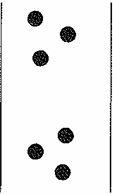
SORTING INTO PYRAMIDS
 المؤلف:
BARBARA MINTO
المؤلف:
BARBARA MINTO
 المصدر:
THE MINTO PYRAMID PRINCIPLE
المصدر:
THE MINTO PYRAMID PRINCIPLE
 الجزء والصفحة:
2-1
الجزء والصفحة:
2-1
 2024-09-03
2024-09-03
 1062
1062
SORTING INTO PYRAMIDS
That the mind automatically imposes order on everything around it has long been recognized. Essentially, it tends to see any sequence of things that occur together as belonging together, and therefore sets about imposing a logical pat tern on them. The Greeks, for example, demonstrated this tendency by looking up at the stars and seeing outlines of figures instead of pinpoints of light.
The mind will group together any series of items that it sees as having a "common fate"-because they share similar characteristics or are near the same place. Take these six dots for example:

When looking casually at them, everyone sees two groups of three dots each, primarily because some of the distances between the dots are smaller than others.
The value of seeing things in logical units is, of course, immense. To demonstrate, read the following pairs of nouns,1 which are normally not related to each other.

Now try to "organize" them by picturing a situation in which each one might be associated-such as the sugar being dissolved in the lake or the boot sitting on the plate. Then cover up the list on the right-hand side and try to remember them through reading the list on the left-hand side. Most people find that they can recall them all without hesitation.
The same organizing phenomenon takes place when you are either listening to or reading ideas. You assume the ideas that appear together, one after the other, belong together, and attempt to impose a logical pattern on them. The pattern will always be that of a pyramid because this is the only form that meets your mind's need to
Stop at the magical number seven
State the logic of the relationship.
1 Based on a series given in Gestalt Psychology by Wolfgang Kohler (Liveright Publishing: Ne ... v York) 1970.
 الاكثر قراءة في Writing
الاكثر قراءة في Writing
 اخر الاخبار
اخر الاخبار
اخبار العتبة العباسية المقدسة


